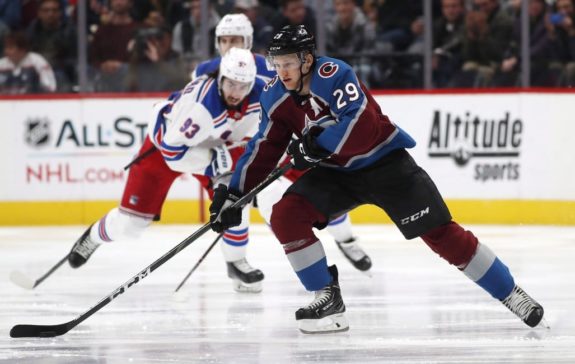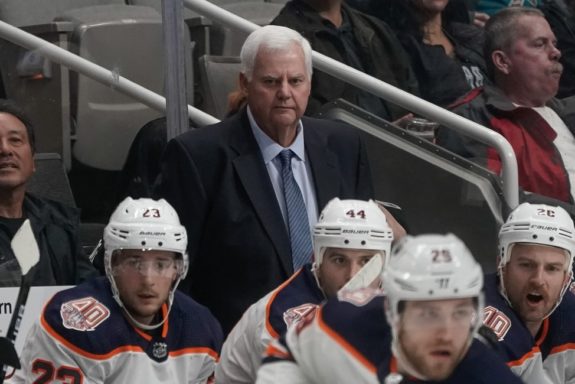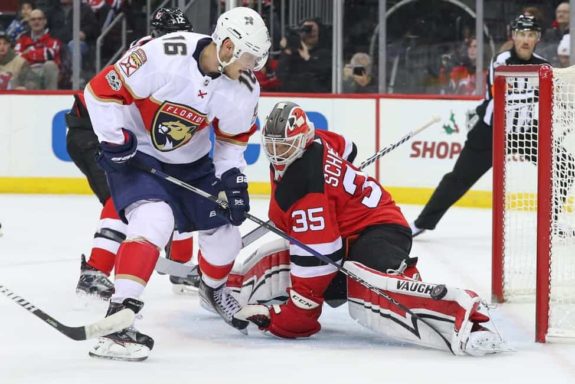Nathan MacKinnon doesn’t really notice when the minutes begin to creep up.
The Colorado Avalanche centre is too invested in the moment — usually one where he’s either trying to help his team get even or push ahead in a tight contest.
The surprise comes after the final buzzer when the stat sheet reveals how much time he’s logged.
“After the game, you’re kind of in shock,” said MacKinnon, who’s had three outings of more than 25 minutes this season. “That’s a lot of minutes. But you get the adrenaline going, especially late when you’re down. You’re pushing. It’s mostly the next day I feel it. Definitely a little sluggish, tough sleeps … things like that.
“But I love it. It’s a lot of fun. We can’t complain about playing a lot.”

MacKinnon is in the same boat as a number of NHL stars this season as teams lean harder and harder on big names up front.
Ilya Kovalchuk averaged an outrageous 24 minutes 44 seconds with New Jersey during the lockout-shortened 2012-13 campaign, but there are six forwards this season on pace to finish next in line behind that number if current ice-time trends continue.
NHL Stars Logging Big Minutes Every Night
Florida’s Aleksander Barkov plays 23 minutes a night, followed by Edmonton’s Connor McDavid (22:49), Winnipeg’s Mark Scheifele (22:42), Anze Kopitar (22:27) of Los Angeles, Edmonton’s Leon Draisaitl (22:09) and Chicago’s Patrick Kane (22:08). MacKinnon, meanwhile, comes in a little further down the list at 21:58.
While top-end defencemen still register more ice time — 14 with at least 40 games of action this season are averaging better than 24 minutes, while four top the 26-minute mark — elite forwards continue to see their numbers creep up.
“You’ve just got to make sure you’re taking care of yourself off the ice,” McDavid said. “The minutes don’t bother me. It’s something that I’ve always had to deal with.”
Kane played 28:50 — the most by a forward this season and just eight seconds fewer than the 28:58 that Kovalchuk was on for two times in 2013 — in an 8-5 loss to New Jersey last month, while Draisaitl (twice), McDavid (twice) and Barkov have also broken the 28-minute barrier in 2018-19.
Edmonton head coach Ken Hitchcock said he doesn’t have an issue running his stars out shift after shift because of the amount of stoppages in games.

“If you watch the way coaches play their top players, they kind of nurture them along,” Hitchcock said. “Then you can hammer down.”
Colorado head coach Jared Bednar, who plays his top line of MacKinnon, Gabriel Landeskog and Mikko Rantanen between 21 and 22 minutes, said he doesn’t worry about ice time most nights.
“If we happen to run them into that 25-(minute) range we like to give them a little bit of time off to get recovered,” he said. “They’re pretty in tune with what they need.”
Vancouver centre Bo Horvat chalked up big minutes early in the schedule because of injuries, and found himself playing differently to conserve energy.
“You have to pace yourself,” he said. “You have to limit your shifts to keep them a little shorter and focus on other aspects of your game.”
Player Performance vs Playoff Push
Travis Green said teams are constantly aware of ice time, but it’s a tricky balance when every point in the standings can mean the difference between making or missing the playoffs.
“In a perfect world, if you asked any coach, they don’t want to play guys over a certain amount of minutes,” Vancouver’s bench boss said. “And yet, you’re also out there trying to win.”
Florida goalie Roberto Luongo said teammates notice and appreciate when a player is chewing up minutes like the 23 that Barkov consistently churns out.
“We cherish him,” Luongo said. “We wish he could play 60.”

But Vancouver centre Jay Beagle, who averages less than 14 minutes further down the lineup, said having an even distribution works better in the long run.
“It’s hard for those top guys to play 25, even over 20 minutes for the whole 82-game season,” said Beagle, who was part of Washington teams where Alex Ovechkin regularly played well over 20 minutes. “You want guys fighting for ice. It brings out the best in everybody.”
Toronto head coach Mike Babcock, who has no forwards averaging more than 20 minutes, pointed to first-place Tampa Bay — where NHL scoring leader Nikita Kucherov tops out at 19:22 — as a model when it comes to ice distribution.
“They’ve got good players on every line,” Babcock said. “Those are the (teams) that tend to play a long time in the spring.”
Knocking on History’s Door
Alex Ovechkin’s next point will push him past Sergei Fedorov for the most all-time by a Russian-born player at 1,180. Washington’s 33-year-old captain also tops the league with 37 goals this season. If he remains No. 1 through 82 games, Ovechkin will become the first player in NHL history to lead the league in goals eight times, breaking his tie with Bobby Hull.
Spring Possibilities
If the playoffs started this week, Toronto and Montreal, which haven’t met in the post-season since 1979, would be first-round opponents. Calgary and Winnipeg currently sit first and second in the Western Conference, with Vancouver knocking on the door for the second wild-card spot and Edmonton just three points adrift. Ottawa, meanwhile, is the only Canadian team out of it, sitting last in the overall standings.
___
With files from Gemma Karstens-Smith in Vancouver
Follow @JClipperton_CP on Twitter
Joshua Clipperton’s weekly NHL notebook is published every Wednesday
Joshua Clipperton, The Canadian Press